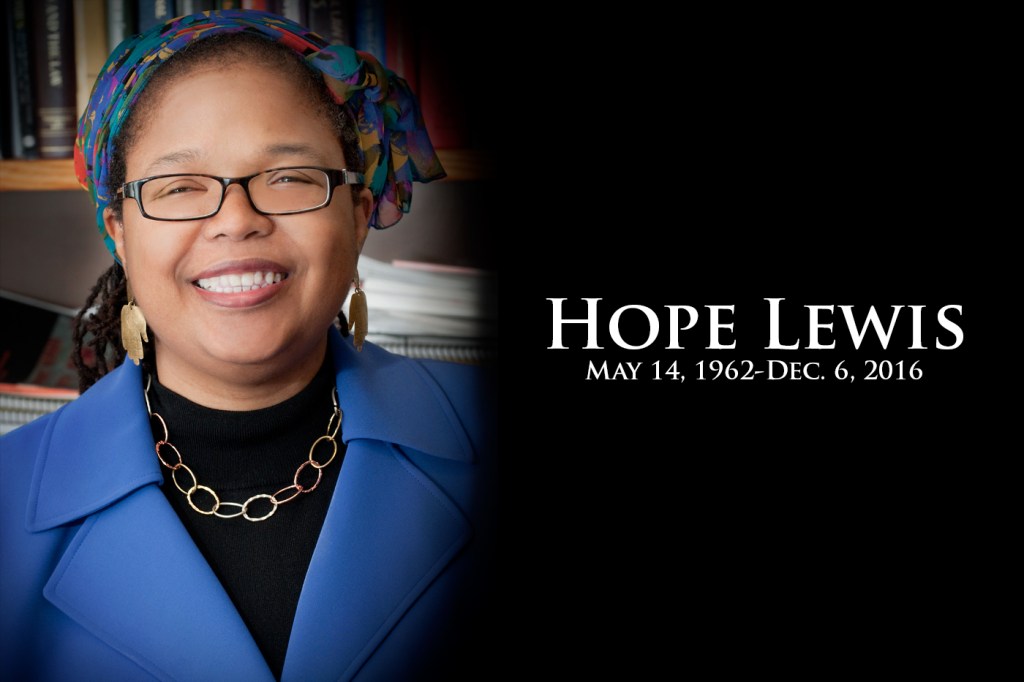Northeastern mourns loss of Hope Lewis, law professor and human rights scholar

By Deborah Feldman
Professor Hope Lewis, a member of the School of Law’s faculty since 1992, died Tuesday after a long illness. She was 54.
Born on May 14, 1962, Lewis was a graduate of the Bronx High School of Science, Harvard College, and Harvard Law School. A passionate champion of the poor and disadvantaged, Lewis focused her teaching and scholarly work on human rights and economic rights in the global economy. She co-founded the law school’s Program on Human Rights and the Global Economy and served as the faculty director of the law school’s Global Legal Studies program.
An internationally recognized legal scholar and commentator on human rights, Lewis authored numerous articles and co-authored the seminal textbook Human Rights and the Global Marketplace: Economic, Social, and Cultural Dimensions. She co-drafted and compiled the “Boston Principles on the Economic, Social, and Cultural Rights of Non-citizens,” a project of the law school’s Program on Human Rights and the Global Economy. She was a founding co-chair of the American Society of International Law’s International Disability Rights Interest Group and served on the ASIL executive council between 2010 and 2013. She also served on the board of governors of the Society of American Law Teachers and the executive committee of the Association of American Law Schools Section on Minority Groups.

Hope Lewis teaching a class in 1993, one year after joining the law school faculty. Photo by Joshua Levine.
She received many awards for her scholarship, activism, and mentorship as well as her heroism in dealing with blindness, the result of the disease that ultimately claimed her life.
Lewis always signed her emails, “Peace, Hope.” Though the latter was her name, not an aspiration, the combination always conveyed something greater than a signature line. It was a reflection of her life’s work, her intentions, the realities she confronted, and the possibilities she imagined.
In 1995, Lewis wrote an op-ed for The Boston Globe, titled “The Long Ride Home,” in which she detailed the difficulties of trying to take a taxi home from the train station in Boston. “It was 2 o’clock in the morning. My thoughts were far away from class, identity or anything but getting to sleep in my own bed,” she wrote. But three drivers deliberately passed her by in favor of white people. “The significance of such events is more pressing and complex than just whether well-dressed black people can get home by taxi late at night. These events expose the fallacy of believing that racism will simply disappear once minorities attain the right educational status, the right job or the right clothes.”
Lewis wrote many scholarly articles and a fair number of pieces for the popular press. In all that she did, both with pen and in deed, her goal was to advance social justice. As our community faces the heartbreak of losing such an inspiring, kind, warm-hearted friend and colleague, we are called to continue the work that was her mission. As Lewis wrote in the Globe about the people who took the cabs that would not take her: “Each expressed surprise, looked back guiltily at me, then hopped right in the cab. After all, what could they do? Refuse the ride? Yes. Refuse the ride. None of us should ever forget the role we play in supporting injustice, even as we just try to make it home.”
Lewis’ funeral will be on Thursday, Dec. 15, at the Bethel AME Church, 40 Walk Hill St., in Boston. The viewing will be at 10 a.m., with a service to follow at 11 a.m. Those who would like to share a memory of Hope may do so at http://www.never-gone.com/memorials/hopelewis. Donations may be made in Lewis’ honor to Partners in Health.





